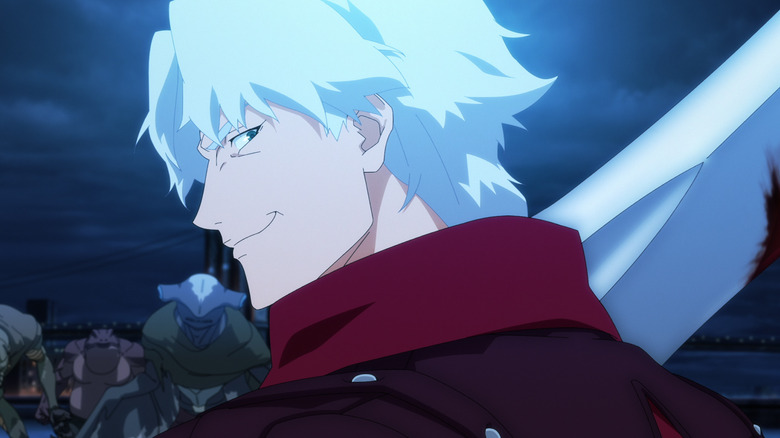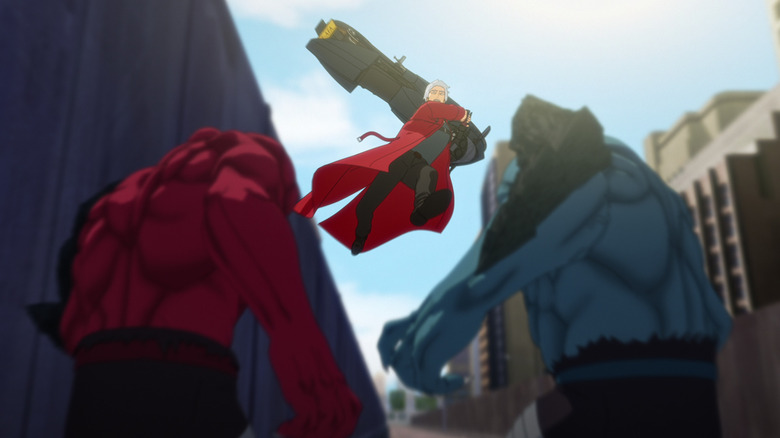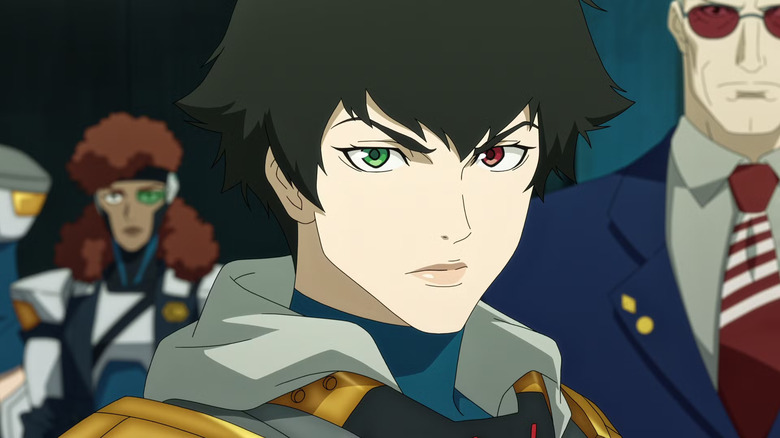Devil May Cry Review: Netflix's Anime Delivers Bold, Character-Driven Storytelling
- Successfully reimagines the game as a War On Terror satire
- Tailor-made for the inner 2000s kid in all of us
- Increasingly ambitious character-driven storytelling
- It might be too uncool to ever admit to liking in public
If you were a 13-year-old at any point during the early to mid 2000s, then you might find Netflix's animated adaptation of the "Devil May Cry" video game series more exhilarating than you'd want to publicly admit. This is a show that has Limp Bizkit's Nu-metal banger "Rollin'" as its theme tune, has a sequence paying homage to the "Matrix Reloaded" freeway car chase — scored to an EDM remix of Papa Roach's "Last Resort," no less! — and features a stand-alone, near-dialogue free rock opera episode featuring new music by Evanescence. If there's any other series in recent memory less concerned with winning over critics so much as appealing to their inner, over-caffeinated teenager, then I'm yet to see it.
Surprisingly, considering how unapologetically uncool the series is, it continues the upward trend of small-screen video game adaptations that punch above their weight class, even if it doesn't ever hit the high watermarks of "The Last Of Us," "Gangs of London," or "Fallout." It's a show that aims to put you in the mindset of a tween seeing something that's slightly too adult; its frenetic, sugar-rush pacing is tailor-made for a young audience, even if its outbursts of gore and largely unnecessary F-bombs aren't.
It's undeniably an acquired taste, and as someone who previously wasn't familiar with the game series, I completely understand why anybody would bail after a single half hour in the presence of the irritating man-child bounty hunter Dante (Johnny Yong Bosch). However, I must confess that the show managed to trigger my post-Y2K nostalgia, so indebted to the pop culture of that decade that it made me feel reverence for a video game I've never played in my life.
One for the 2000s kids
Set in an alternate, post-9/11 America, we're introduced to the demon hunter Dante just before his particular set of skills come in high demand from the right-wing, Evangelical Christian U.S. government. Faced with a vice president (Kevin Conroy, in his last screen role) determined to prove the existence of God, the threat of portals from Hell and other Satanic dimensions being opened with their demonic inhabitants set to overwhelm the human world proves to be an unexpected gift. A mysterious villain known as the White Rabbit (Hoon Lee) is overseeing this plan, arguing that the devastation caused in his home dimension has made it necessary for the inhabitants of those universes to be rehoused here, even if that means the beasts causing chaos and destruction will come through to this side too.
It's a moral dilemma, unsubtly modeled on America's jingoistic paranoia during the War On Terror years, which helps give the series more food for thought than its video game predecessor; I wouldn't be surprised if some of the internet's more insufferable gamer commentators were to launch an all-out assault on the series for being "woke." However, this is where I feel the personal touch of showrunner Adi Shankar, who previously brought another Japanese game franchise to life on Netflix with his successful "Castlevania" series, and here appears to be cashing in a blank check to tell a more personal story through the lens of well-known IP. As an Indian American who immigrated to Rhode Island just two days before September 11, a series in which the lives of vulnerable people from a distant land hang in the balance due to U.S. forces who automatically distrust them seems to be directly riffing on the social landscape he found himself in.
Progressive satire or right-wing fantasy?
What makes this more interesting is that Adi Shankar's personal politics appear to have shifted to the right in more recent years, with the showrunner recently spotted as a guest at Donald Trump's second inauguration ball. This adds another layer to the series as a morally knotty allegory for the post-9/11 immigrant experience, clearly modeling itself after the likes of "Black Panther" in how it wants to force the viewer into an internal conflict between the protectionist worldview of its military protagonists and the far more complex perspective of a villain whose charismatic arguments in favor of opening up this universe may easily win you over. I can just as easily imagine the series getting written off as a regressive, right-wing fantasy as I can a progressive stand against American values, and to its credit, the fact it never settles on either worldview or spoon-feeds the audience any morals to this story never makes it feel incoherent. Personally, I can't quite understand how a writer behind such a project could align himself with right-wing values — the fact that he appears to makes it far more interesting than if this were a case of an artist wearing their own progressive politics on their sleeve.
Shankar has also welcomed parallels between his animated adaptation — the second, after a 2007 anime series, which was also produced by Capcom — and two of the tentpole superhero blockbusters of the 2000s: "Iron Man" and "The Dark Knight." Beyond a charismatic lead and fantastical reimagining of a War On Terror narrative, the comparison to Tony Stark's big screen origin story holds little weight for me, but Christopher Nolan's Batman sequel is a far more obvious cornerstone reference for the showrunner, with later episodes transitioning to more character-driven storytelling, highlighting how the hero and villain are two sides of the same coin. It's a well-honed trope in comic book storytelling — you can stream another variation of this right now with "Daredevil: Born Again," which Looper also reviewed — and it's in this late season stretch where the creative team properly finds their feet in putting a unique spin on this conceit. This is the point of the show where we get the previously mentioned, near-dialogue-free rock opera, the shortest but most ambitious installment of the inaugural season, and the kind of big swing I hope will continue in a potential second outing, with the moral murkiness now firmly established as a feature and not a bug of the show.
I completely empathize with any fans of the "Devil May Cry" franchise who are vowing to boycott the show because of its creator's politics. For me, however, the inherent tensions between a new socially conservative worldview and the progressive stances made in prior projects only makes it more fascinating to sit through, with far more to unpack by the season's end than you may expect from the simple sensory overload of 2000s nostalgia in the first few episodes.
"Devil May Cry" premieres on Netflix on April 3.


